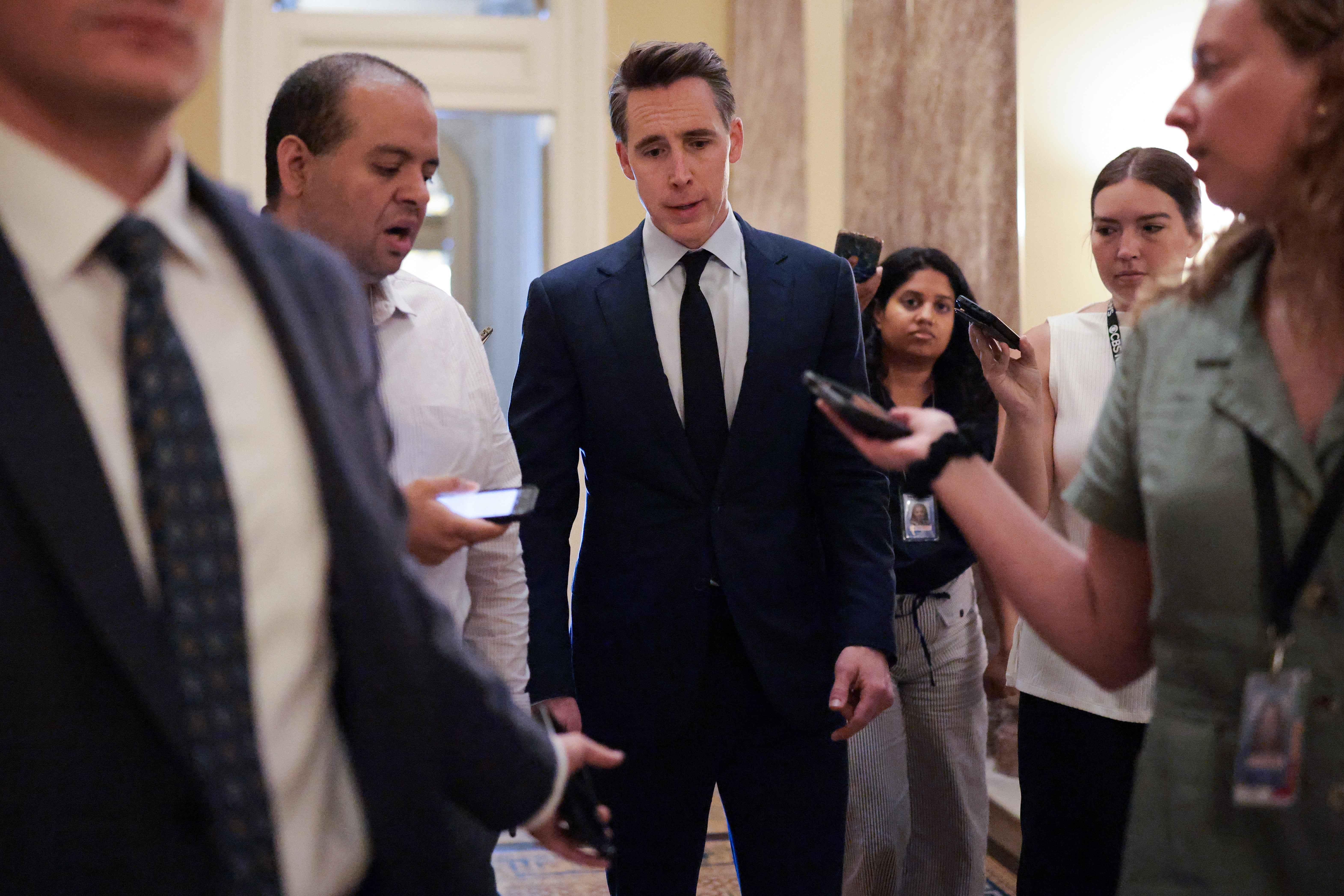Sen. Josh Hawley laughed off President Donald Trump’s attack on him, telling The Independent that he and the president met after Trump called him a “second-tier” senator.
Earlier in the day, Trump had posted on Truth Social and attacked the Missouri Republican for his legislation that would ban stock trading among lawmakers as well as the president and vice president, and for not supporting a measure by Sen. Rick Scott (R-FL) that would review former House Speaker Nancy Pelosi’s stock trading.
Hawley had named his bill the PELOSI Act, as a play on her and her husband’s trading.
“He is playing right into the dirty hands of the Democrats,” Trump said. “It’s a great Bill for her, and her ‘husband,’ but so bad for our Country! I don’t think real Republicans want to see their President, who has had unprecedented success, TARGETED, because of the ‘whims’ of a second-tier Senator named Josh Hawley!"
But Hawley told The Independent that he and Trump later spoke.

“He and I had a nice visit this afternoon and he reiterated that he is in favor of a stock ban for members of Congress that he wants to see it passed,” he said. “He thinks we need to move full speed ahead.”
Despite the fact that in 2021, Hawley led efforts to object to the 2020 presidential election results even after the Senate reconvened when the riot at the US Capitol ended, he has occasionally been on the opposing side of Trump’s policies. For much of the debate around the “One Big, Beautiful Bill,” Hawley raised objections about cuts to Medicaid, though he ultimately voted for the bill.
Banning members of Congress from trading stocks has long held bipartisan support. Rep. Alexandria Ocasio-Cortez (D-NY), Sen. Jon Ossoff (D-GA) and even former congressman Matt Gaetz supported legislation to ban members from trading stock.
Despite this, the legislation has long stalled. Many Democrats and Republicans have pointed to Pelosi and her husband Paul’s success on the stock market as a potential reason the bill never received a vote on the floor, though she expressed openness to legislation toward the end of her tenure.
Hawley clashed earlier with Senate Republicans on the Senate Homeland Security and Governmental Affairs about his legislation, which he entitled the PELOSI Act. Republicans argued that the legislation would unfairly target Trump.
But committee chairman Rand Paul (R-KY) argued that since the bill would only apply to lawmakers after their next term began, it provided cover to Trump and Vice President JD Vance.
“But the fact that they don’t want to apply it to Donald Trump means that it’s a really crummy bill and it would do terrible things to Donald Trump’s finances,” Paul said.
The committee passed his legislation to ban members of Congress and their spouses from trading stocks. But Hawley was the sole Republican to vote on his own legislation and it passed with the help of Democrats.
In the end, Hawley was the only Republican on the committee to vote for the legislation.
But Hawley does not have much reason to worry about losing his seat for a while. He won re-election in 2024 and would not be up again for another six years, after Trump has left office.
Pelosi, for her part, endorsed the bill, which was renamed as the HONEST Act.
“While I appreciate the creativity of my Republican colleagues in drafting legislative acronyms, I welcome any serious effort to raise ethical standards in public service,” she said. “The HONEST Act, as amended, rightly applies its stock trading ban not only to Members of Congress, but now to the President and Vice President as well.”
On Tuesday, Hawley floated legislation that would send $600 tariff rebate checks to Americans, but not to “Biden voters,” only to “Trump blue-collar voters.”
“Well, you wouldn’t give it to everybody, you’d give it to the working people,” the Missouri Republican told far-right podcaster and former Trump adviser Steve Bannon on Tuesday. “You’d give it to our people.”
“I mean, you know, the rich people don’t need it … what I mean by that is all those Democrat donors of Wall Street, all these hedge fund guys, who all hate the tariffs, by the way.”







